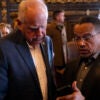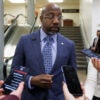The Obama administration continues to have difficulty in gaining support for its failing strategy to defeat the Islamic State (also known as ISIS or ISIL).
Secretary of Defense Ashton Carter and Chairman of the Joint Chiefs of Staff Gen. Martin Dempsey inadvertently ignited a firestorm on Tuesday when they testified before the Senate Armed Services Committee about the administration’s continually evolving plans for countering the Islamic State.
Carter made news when he revealed that the administration’s $500 million program to train and equip “moderate” Syrian rebels to fight the Islamic State had so far produced only 60 vetted candidates that were in training.
This is a far cry from the 5,000 fighters that are supposed to be trained by the end of the first year of the program.
Members of the committee on both sides of the aisle agreed that this meager result raised questions about the viability of the administration’s strategy.
Although Carter cautioned that the program was only in its early stages, he admitted that there had been major problems in attracting recruits due to the lack of a U.S. commitment to provide them with greater military protection and a lack of enthusiasm for the administration’s conditions: that they fight the Islamic State and not the Assad dictatorship.
He also maintained that vetting the almost 7,000 volunteers was a slow and difficult process.
Carter noted that the Iraqi military training programs were making better progress but also had been slowed by a lack of trainees.
As of June 30, the 3,550 U.S. personnel deployed at six locations around the country had received enough Iraqi personnel to train about 8,800 Iraqi army soldiers and Kurdish militiamen, along with about 2,000 counter-terrorism forces.
The Pentagon’s slowly-building air campaign against the Islamic State also received heavy criticism.
Sen. John McCain, R-Ariz., a former naval fighter pilot, blasted the administration for “a disturbing degree of self-delusion” about its military efforts and complained:
Pilots will tell you that they are only as good as the targets they receive, and when three-quarters of our air missions against ISIL still return to base without dropping weapons, that is indicative of a fundamental problem with our air campaign.
Although the administration has boasted about launching more than 5,000 air strikes over the last year, this is just a fraction of the more than 30,000 sorties that the Clinton administration launched over just 78 days to push Serbian forces out of Kosovo in 1999.
The Serbs also posed a much lesser threat to the United States, than the Islamic State currently does.
The administration, which should have been jolted out of its complacency by the fall of Mosul more than a year ago, if not the fall of Fallujah in January 2014, still has not created an effective strategy in the war against the Islamic State.
It has barred combat operations by American ground troops, dragged its feet in deploying military advisers, restricted them from being deployed with front-line Iraqi forces and put tight constraints on airstrikes to avoid civilian casualties.
The administration’s half-hearted, half-measures have produced little progress in Iraq and even less in Syria.
The net effects of the administration’s policies have enabled the Islamic State insurgents to inflict many more civilian casualties and attract a flood of fanatic followers.
The status quo must change.
Hopefully, Secretary Carter and Gen. Dempsey, acting as lightning rods for the micro-managers in the White House, received enough high-voltage criticism at the hearing to energize a comprehensive rethinking of the administration’s counter Islamic State policy.
See: Obama, It’s Time to Stop Shifting the Blame and Develop an ISIS Strategy






























